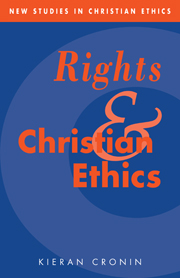Book contents
- Frontmatter
- Contents
- General editor's preface
- Preface
- 1 Metaethics: meaning and justification
- 2 Initial elucidation of rights-language
- 3 Conceptual scepticism and rights
- 4 Moral and theological scepticism
- 5 Imagination, metaethics and rights
- 6 Theological imagination and rights
- 7 Rights, power and covenant
- 8 Theological foundations of rights-language
- Epilogue
- Notes
- Index
4 - Moral and theological scepticism
Published online by Cambridge University Press: 29 September 2009
- Frontmatter
- Contents
- General editor's preface
- Preface
- 1 Metaethics: meaning and justification
- 2 Initial elucidation of rights-language
- 3 Conceptual scepticism and rights
- 4 Moral and theological scepticism
- 5 Imagination, metaethics and rights
- 6 Theological imagination and rights
- 7 Rights, power and covenant
- 8 Theological foundations of rights-language
- Epilogue
- Notes
- Index
Summary
Having defended the language of rights in the face of conceptual objections which question the value of the underlying concept, I now turn to another form of attack on the language of rights, a two-pronged attack from the point of view of normative moral theory in both secular and Christian ethics. There is a certain overlap between these objections, since Christian ethicists and theologians have tended to echo some of the normative moral objections of secular moralists and moral philosophers. I also grapple with more radical moral theological objections which have some connection with mainstream moral philosophy.
I begin, then, with some rather obvious arguments why the language of moral rights is said to be not really morally respectable. First, the language of rights tends towards individualism and egoism, and tends to play down social solidarity and the common good. Second, the exercise of rights, especially the use of the faculty of ‘claiming’, is a sign of a growing adversarial trend in modern life which sets people at loggerheads, and does little for social harmony and peace.
From here I pass on to a more radical form of moral scepticism which has a clear theological reference as well as a secular moral one. I consider what may be called an ‘antinaturalist’ position connected with the question ‘Can a good man be harmed?’ This position is radical indeed, in so far as it practically refuses to see much of ordinary human suffering, including what comes through injustice, as ‘harmful’ and as the object of rights.
- Type
- Chapter
- Information
- Rights and Christian Ethics , pp. 81 - 114Publisher: Cambridge University PressPrint publication year: 1993



